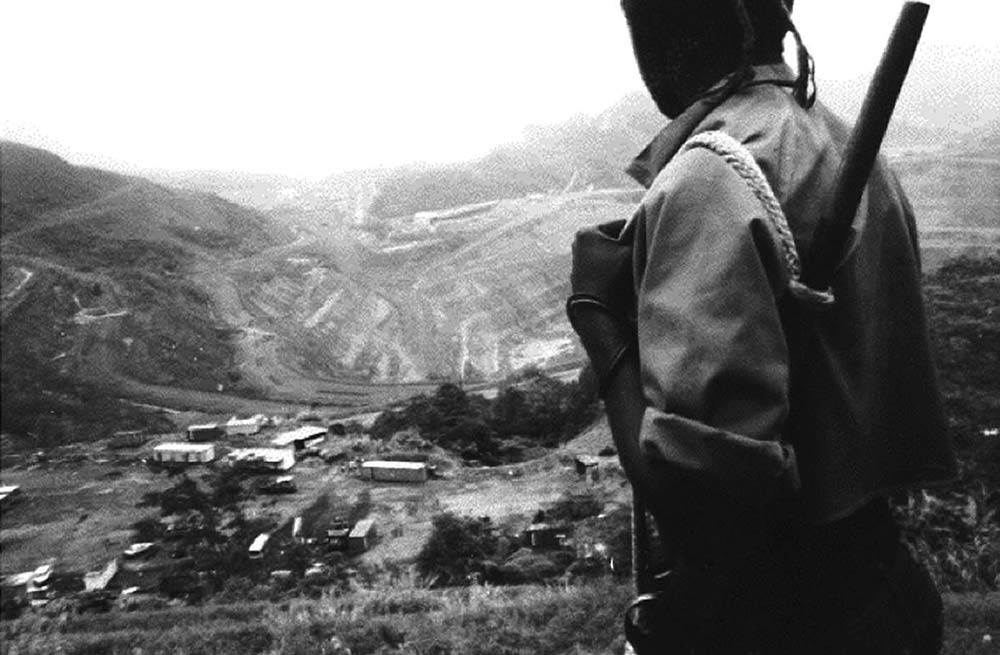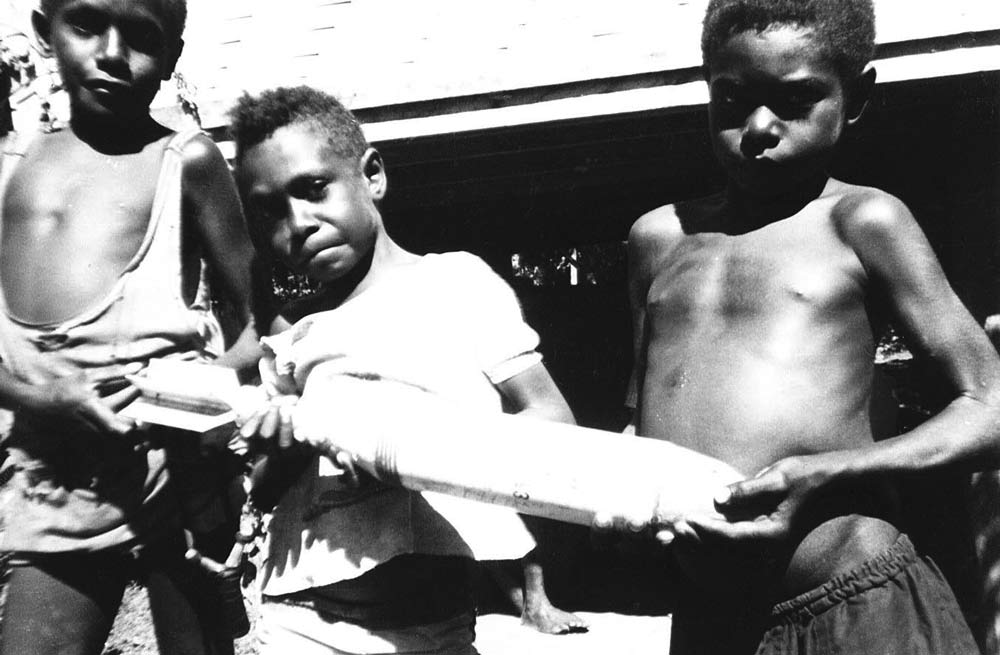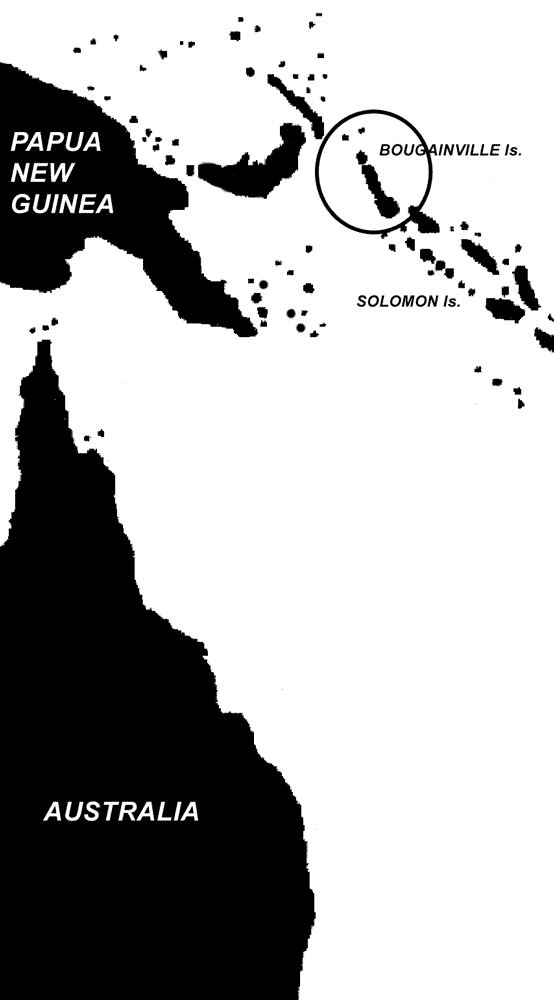
International SQUALL
Killing Without Question
Who cares about the Pacific Island of Bougainville? Certainly not a series of governments and corporations who have successively used its people and resources as profit-fodder. Neil Goodwin charts the island's battered history and the involvement of British mining company RTZ.
Squall 14, Autumn 1996, pp. 58-59.
In November 1988 a handful of villagers broke into the Panguna mine on the tiny Pacific island of Bougainville, stole explosives from the company stores, and blew up one of the largest copper mines in the world.
Eight years on, in what has now become the region’s longest war, the islanders continue to defy the superior might of the Papua New Guinea Defence Force (PNGDF); their sling-shots, homemade guns and vehicles run on distilled coconut oil, pitted against Australian-supplied helicopters, patrol boats, mortars and automatic weapons.
In a statement made in 1992, defiant Panguna landowners declared: “We now understand and have seen with our own eyes the destructive effects of the Bougainville copper mine operations on our land, our environment, our society and our culture. The mine will remain closed for the rest of our lives.”
Since it was forcibly established by Australian troops in 1969, the mine has grown into a colossal crater half a kilometre deep by seven kilometres wide. Over a billion tonnes of waste have been bulldozed into the Jaba River Valley, poisoning a thirty five kilometre stretch of riverbank with mercury, sulphur and arsenic, and turning one of the island’s largest river systems bright blue.
“Our fish, sometimes we would find them floating in the river. Sometimes in the sea,” says Marcelline Tunin, whose brother was murdered by the PNGDF in 1990. “Every time we complained they would say: ‘It’ll be alright. Y ou will get the money’. But money compared to what we lost is nothing.”

In the years prior to the bombing, Panguna had earnt its owners Conzinc Rio Tinto (CRA) - an Australian subsidiary of the British mining giant Rio Tinto Zinc (RTZ) - an estimated US$6 billion. At its peak during the mid-’70s, it generated AUS$1 million per day, prompting Sir Val Duncan, RTZ’s Chairman at the time, to refer to it as ‘the jewel in our crown’.
Despite losing traditional fishing rights and 220 hectares of rainforest, displaced locals only received 0.06 per cent of the company’s profits in compensation. Promised schools and other facilities never materialised, and Bougainvillean mineworkers were paid only half the wages of migrant workers.
Panguna became the latest outrage in a 200 year history of colonial exploitation. First the Dutch, then the Germans and British, descended on the region and carved it up into spheres of influence without any regard for cultural traditions.
In exchange for British concessions in Somoa, Germany gave Bougainville to the crown in 1899. Britain attached the island to its North Guinea territories and, after World War I, added Germany’s New Guinea territories to Australian-controlled Papua to form Papua New Guinea (PNG).
When PNG obtained independence from Australia in 1975, Bougainville’s pleas for self-determination went unnoticed. The island continued to be raped and poisoned for a further 13 years; its population exposed to long-term illness and death.
By 1988, the islanders had had enough, and what at first began as peaceful protest soon developed into a full-blown ecological revolution.
With 45 per cent of its entire export earnings now under threat, the PNG Government reacted swiftly. Armed riot squads were sent in to quell the unrest, closely followed by a full military presence. By March 1990, against all odds, the newly-formed Bougainville Revolutionary Army (BRA) managed to force the PNG military from the island.
PNG retaliated by imposing, on Australian military advice, a complete blockade of the island, thereby cutting off all supplies of food, fuel and medicines. PNG troops were ordered to sink all unauthorised vessels.
“Bougainville is a tropical island; a breeding ground for countless diseases,” says Martin Miriori from the Bougainville Interim Peace Office. ‘To deny the people medical supplies is to condemn thousands of civilians to death. The blockade is a form of germ warfare. It is highly illegal and inhumane.”
Since the start of the war the islanders have been subjected to an entire catalogue of human rights abuses. Babies as young as three months have been shot, women gang-raped in front of children, men burnt at the stake, tortured and mutilated beyond all recognition. The list of atrocities is endless. According to health workers and church groups the war has now claimed an estimated 10,000 lives (about 8 per cent of the population).
RTZ has maintained a virtual silence throughout. “For four years they kept their mouths shut at Annual General Meetings,” says Roger Moody, spokesperson for the anti-RTZ pressure group PARTIZANS. “On one occasion one man was actually punched in the face by another shareholder as soon as he mentioned the word ‘Bougainville’. To date, their most revealing statement has come from Leon Davies, CRA’s Chief Executive, in which he admitted that ‘mistakes had been made regarding indigenous people’.”
RTZ also owns a 12 per cent stake in the US-owned Freeport copper and gold mine in West Papua. In circumstances very similar to those on Bougainville, Amungme and Komoro tribespeople are fiercely resisting a 2.5 million hectare expansion within their sacred lands. RTZ are currently investing $1.8 billion in the expansion, which will involve the relocation of an estimated 2,000 people. This will be backed-up by the Indonesian military, whose brutal 33-year occupation of West Papua has so far cost 43,000 lives.
At present, the mine discharges 110,000 tonnes of highly toxic waste into the Aykwa River every day, with horrific consequences. In 1980, for example, 216 children died from copper poisoning.
Last March, despite RTZ’s assurances that ‘the great majority of the population accept the mine’s presence’, serious rioting erupted in three surrounding towns. Six thousand people ransacked Freeport’s offices and facilities, forcing a four day suspension of operations. As one Amungme leader put it: ‘Freeport is digging out our mother’s brain. That is why we are resisting’.
“Both PNG and Indonesia face the real possibility of many ‘Bougainvilles’ erupting all over the Asia-Pacific,” claims Dave Burgess, from the Bougainville Freedom Movement. “The clamour for self-determination has been building up in countries like East Timor, West Papua and Papua New Guinea for decades. By pumping $32 million of military aid into Bougainville, you could say that Australia has simply added a few more minutes onto a much larger regional time-bomb.”

Following on from threats made by Sir Julius Chan, PNG’s Prime Minister, last May that Bougainville’s “darkest hour had come”, intelligence reports revealed that preparations were under way for a major military offensive. PNG embarked on a US$10 million spending spree in order to re-fit and re-arm 1,100 troops.
‘Operation Shoot Up’ began in late June. According to intercepted orders, the PNGDF intend to sweep the island in a pincer movement, ‘destroy all food - gardens, houses and any shelter’ and ‘ shoot at anyone [they] find in the jungle and to kill and kill’. An estimated 12,000 civilians living within the so-called ‘clean-up’ zone around the Panguna mine are to be ‘forced into care centres’. Those who fail to comply ‘must be beaten’.
In a chilling reminder of the My Lai massacre (when 130 Vietnamese women and children were butchered by US marines in 1968), the PNGDF have been instructed that ‘any civilians who are suspected of harbouring the BRA must be killed without question’.
Despite the PNGDF’s superior firepower, the BRA’s General Commander, Sam Kauona, has welcomed the declaration of an ‘all out war’. “The morale of the BRA is so high, that we are very excited about it,” he says. “I hope that this will be the final deciding game.”
For further reading on RTZ’s history of greasing the palms of practically every human rights violator this century, Squall recommends ‘PLUNDER’. The author is offering a special offer to Squall readers of £4.50 (including p+p), by writing to PARTIZANS, 218 Liverpool Road, London N1 1LE (cheques made payable to PARTIZANS).
Related Articles
Pirating The Airwaves - Pirate radio making waves against oppressive regimes - Squall 14, Autumn 1996
